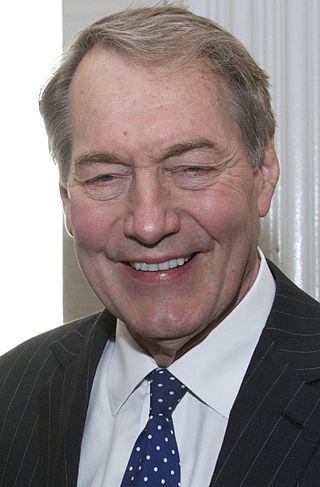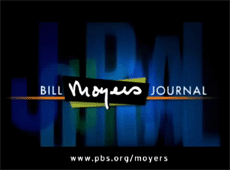
The Corporation for Public Broadcasting (CPB) is an American publicly funded non-profit corporation, created in 1967 to promote and help support public broadcasting. The corporation's mission is to ensure universal access to non-commercial, high-quality content and telecommunications services. It does so by distributing more than 70 percent of its funding to more than 1,400 locally owned public radio and television stations.

Bill Moyers is an American journalist and political commentator. Under the Johnson administration he served from 1965 to 1967 as the eleventh White House Press Secretary. He was a director of the Council on Foreign Relations, from 1967 to 1974. He also worked as a network TV news commentator for ten years. Moyers has been extensively involved with public broadcasting, producing documentaries and news journal programs, and has won many awards and honorary degrees for his investigative journalism and civic activities. He has become well known as a trenchant critic of the corporately structured U.S. news media.

National Educational Television (NET) was an American educational broadcast television network owned by the Ford Foundation and later co-owned by the Corporation for Public Broadcasting. It operated from May 16, 1954, to October 4, 1970, and was succeeded by the Public Broadcasting Service (PBS), which has memberships with many television stations that were formerly part of NET.

The McLaughlin Group was a syndicated half-hour weekly public affairs talk show television program in the United States, hosted by John McLaughlin from 1982 until his death in 2016. Prompted by the host, the group of four pundits discussed current political issues in a round table format. A revival reuniting the regular panelists aired intermittently between 2018 and 2020.

Charles Peete Rose Jr. is an American journalist and talk show host. From 1991 to 2017, he was the host and executive producer of the talk show Charlie Rose on PBS and Bloomberg LP.

American Public Television (APT) is an American nonprofit organization and syndicator of programming for public television stations in the United States. It distributes public television programs nationwide for PBS member stations and independent educational stations, as well as the Create and World television networks.

Alabama Public Television (APT) is a state network of PBS member television stations serving the U.S. state of Alabama. It is operated by the Alabama Educational Television Commission (AETC), an agency of the Alabama state government which holds the licenses for all of the PBS member stations licensed in the state. The broadcast signals of the nine stations cover almost all of the state, as well as parts of Florida, Georgia, Mississippi and Tennessee. The network produces public affairs, cultural, natural history, and documentary programming; broadcast and online education programs for classroom use and teacher professional development; and electronic field trips serving K-12 students.
Now on PBS, shown onscreen as NOW, is a Public Broadcasting Service newsmagazine which aired between 2002 and 2010, focusing on social and political issues.
Mental Engineering was a public television series where show creator and host John Forde leads a panel discussion featuring critical and humorous analysis of TV commercials. The show originated as a public-access television cable TV program on the Saint Paul Neighborhood Network (SPNN) in St. Paul, Minnesota in 1997.

The Public Broadcasting Act of 1967 issued the congressional corporate charter for the Corporation for Public Broadcasting (CPB), a private nonprofit corporation funded by taxpayers to disburse grants to public broadcasters in the United States, and eventually established the Public Broadcasting Service (PBS) and National Public Radio (NPR). The act was supported by many prominent Americans, including Fred Rogers, NPR founder and creator of All Things Considered Robert Conley, and Senator John O. Pastore of Rhode Island, then chairman of the Senate Subcommittee on Communications, during House and United States Senate hearings in 1967.

Bill Moyers Journal was an American television current affairs program that covered an array of current affairs and human issues, including economics, history, literature, religion, philosophy, science, and most frequently politics. Bill Moyers executive produced, wrote and hosted the Journal when it was created. WNET in New York produced it and PBS aired it from 1972 to 1976.
Foreign Exchange is an American weekly, half-hour international affairs program that aired on the Public Broadcasting Service (PBS) public television stations. The program premiered on April 1, 2005, and for three seasons was hosted by author and journalist Fareed Zakaria. Beginning in January 2008, journalist Daljit Dhaliwal became the new host and the title of the program was changed accordingly. The program explores current international issues in conversations with journalists, politicians, and other newsmakers, and examines America's role in an increasingly globalized world. The final episode aired October 9, 2009.

The WGBH Educational Foundation, doing business as GBH since August 2020, is an American public broadcasting group based in Boston, Massachusetts. Established in 1951, it holds the licenses to all of the PBS member stations in Massachusetts, and operates its flagship station WGBH-TV, sister station WGBX-TV, and a group of NPR member stations in the state. It also owns WGBY-TV in Springfield, which is operated by New England Public Media under a program service agreement.
Create is an American digital broadcast public television network broadcast on digital subchannels of PBS member stations. The network broadcasts how-to, DIY and other lifestyle-oriented instructional programming 24 hours a day.

CUNY TV is a non-commercial educational station of the City University of New York, based in New York City. It offers telecourse programming in various subjects ranging from mathematics, physics, and biology to history, art, and social studies. It also provides cultural programming with shows in German, Spanish, and French. The station was first established in 1985. In 2007, the station became a full-capacity HD studio and post-production facility complete with a six-camera mobile production truck.

World Channel, also branded as World, is an American digital multicast public television network owned and operated by the WGBH Educational Foundation. It is distributed by American Public Television and the National Educational Telecommunications Association and features programming covering topics such as science, nature, news, and public affairs. Programming is supplied by the entities, as well as other partners such as WNET and WGBH. It is primarily carried on the digital subchannels of PBS member stations.

Nature is a wildlife television program produced by Thirteen/WNET New York. It has been distributed to United States public television stations by the PBS television service since its debut on October 10, 1982. Some episodes may appear in syndication on many PBS member stations around the United States and Canada, and on the Discovery Channel. This series currently airs on Wednesday on PBS.

The Public Broadcasting Service (PBS) is an American public broadcaster and non-commercial, free-to-air television network based in Arlington, Virginia. PBS is a publicly funded nonprofit organization and the most prominent provider of educational programs to public television stations in the United States, distributing shows such as Frontline, Nova, PBS News Hour, Masterpiece, Sesame Street, This Old House and American Experience.
SkyWeek was a weekly astronomy television program created by Sky & Telescope magazine. The show was hosted by Tony Flanders, associate editor of Sky & Telescope magazine. Each episode of the program was released in one, three, and five-minute formats; and, the show's content and format were similar to that of another weekly astronomy program called Star Gazers. SkyWeek was carried by many PBS affiliates.














